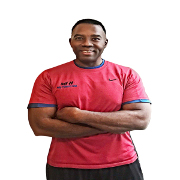 Photo: Getty Images
Photo: Getty Images
Muscle is metabolically active tissue and fat tissue is not. So, fat tissue contributes nothing to help you burn calories. If you want to burn more calories and fat, even at rest, build muscle mass on your body.
Building muscle mass has benefits beyond making you look physically better and strengthening your bones. Do strength training throughout your life to maintain critical muscle mass and avoid sarcopenia (diminishing muscle mass).
"Muscle is our largest metabolically active organ, and that's the backdrop that people usually forget," said Kent Adams, director of the exercise physiology lab at Cal State Monterey Bay. Strengthening the muscles "has a ripple effect throughout the body on things like metabolic syndrome and obesity."
Historically, strength training was limited to athletes, but in the last 20 years, its popularity has spread to the general public, said Jeffrey Potteiger, an exercise physiologist at Grand Valley State University in Grand Rapids, Mich., and a fellow of the American College of Sports Medicine. "One can argue that if you don't do some resistance training through your lifespan, you're missing out on some benefits, especially as you get older or battle weight gain," he said.
And, as I often say, don’t become a “cardio queen” and neglect strength training.
During cardio exercise, the heart loads up with blood and pumps it out to the rest of the body: As a result, Potteiger said, "the heart gets better and more efficient at pumping."
But during resistance training, muscles generate more force than they do during endurance exercises, and the heart is no exception, said Potteiger. During a strength workout, the heart's muscle tissue contracts forcefully to push the blood out. Like all muscles, stress causes small tears in the muscle fibers. When the body repairs those tears, muscles grow. The result is a stronger heart, not just one that's more efficient at pumping.
A 2010 study in the Clinical Journal of the American Society of Nephrology suggested that people on dialysis can benefit from building muscle. Researchers found that kidney dialysis patients who had the most lean muscle mass -- a measurement derived from the circumference of the mid-arm muscle -- were 37 percent less likely to die than the patients who had the least.
"This is something that has an impact on survival," said Dr. Kamyar Kalantar-Zadeh, a principal researcher at the Los Angeles Biomedical Research Institute and coauthor of the study. "It's not just about having more muscle and looking better -- we're talking about life and death."
And, finally, Dr. Miriam Nelson, a Tufts University researcher and author of the book, “Strong Women Stay Slim,” showed that a group of women who followed a weight loss diet and did weight training exercises lost 44 percent more fat than those who only followed the diet.
Here are three steps to take now and improve your health:
1. Do three 20-minute strength training workouts weekly, circuit-style. Work harder for a shorter period of time and you'll get more fat burn and calorie burn during and after your workout!
Do as many compound strength exercises (with weights or bodyweight) standing up as possible. These types of exercises work major muscle groups and many times are full-body strength exercises.
Squats, deadlift, lunges, standing bentover rows, squat-to curl-to press and bench press are great examples. Full-body core exercises like planks and side planks work well also. Spend less time on "mirror exercises" like bicep curls, calf raises and tricep extensions.
2. Do two to three sessions of 20-minute interval cardio sessions per week. Mix up your modes of exercise such as running on grass, treadmill or stepmill. Bodyweight cardio will work as a dual strength/cardio activity.
3. Base your meal plans on your basal metabolic rate, activity level and weight loss/weight gain goals. Choose nutritious foods that you enjoy and comply with your meal plan at least 90 percent of the time.
Take charge of your health today by taking action!
Sources:
Jeffrey Potteiger, exercise physiologist at Grand Valley State University; Fellow of the American College of Sports Medicine.
Strength training does more than bulk up muscles
http://articles.latimes.com/2011/feb/13/health/la-he-adv-strength-training-20110213
Kent Adams, director of the exercise physiology lab at Cal State Monterey Bay
2010 study in the Clinical Journal of the American Society of Nephrology, Dr. Kamyar Kalantar-Zadeh, principal researcher and coauthor
http://articles.latimes.com/2011/feb/13/health/la-he-adv-strength-training-20110213
Dr. Miriam Nelson, Tufts University; Author, “Strong Women Stay Slim”
Reviewed May 24, 2011
Edited by Alison Stanton
Mark Dilworth, BA, PES, CPT is a Certified Personal Trainer and former NCAA Division I athlete. Mark is the owner of My Fitness Hut, Her Fitness Hut, Sports Fitness Hut and My Nutrition Hut. Mark’s Fat Blaster Athletic Training System has been proven to give his clients the fit, sculpted and athletic-type bodies they want. Visit Mark’s main site:
Your Fitness University http://yourfitnessuniversity.com



Add a Comment4 Comments
Hi Amylynn....thanks for reading this post. I spread this message every day on my blogs. You would like herfitnesshut.com This is my site just for women...check it out when you get the chance.
June 18, 2011 - 8:17pmThis Comment
Love this article. It's so true and knowledge is motivating. "Focus on fat loss and not weight loss." I wish you could spread this advice to the world! =]
June 17, 2011 - 9:57amThis Comment
I would recommend a healthy, nutritious diet, regular exercise (resistance and cardio training), adequate sleep and healthy lifestyle habits. This way, you will burn fat and transform your body. Focus on fat loss and not weight loss. You don't need weight loss pills. They don't work long-term.
May 25, 2011 - 12:58amThis Comment
Do anyone know if Mega-T is a good weight loss pill.If not what is safe and works?
May 24, 2011 - 8:42pmThis Comment